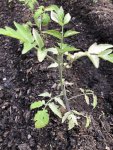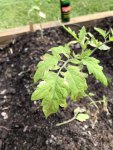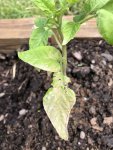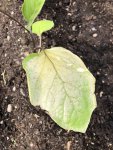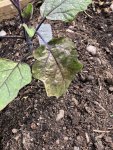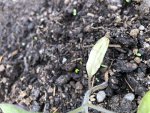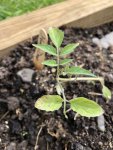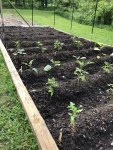Hello!
Amidst this COVID crisis and with some classes being cancelled, I embarked on a mission to create a thriving diverse garden despite having little time.
I've put so much effort and money into this only to see that my plants are now all dying. Many I've started from seed, some purchased young. I've never had this issue before when gardening in the past.
How I built it:
I dug out about a 6-8 inch deep rectangle that is 8'x16'. The soil here is thick clay, very hard when dry, super muddy when wet - so I could not plant in the soil.
-I framed it with 4''x4'' pieces so it is about 10-12'' deep.
-I filled it with composted horse maneur purchased from someone off Craigslist (I'm in a small upstate NY town where theres plenty of farms).
My plants were all very healthy indoors and growing nicely with deep green leaves. My Squash seemed to have some issue however, and so did my Ichiban eggplant, but they were flowering and surviving alright (I'm assuming its aphids or some pest issue - for which I've ordered neem oil for - will be making my own spray when it comes).
The night after planting, temperatures dropped to around 40F which was not predicted. However, plants that did not get transplanted into the garden bed seem to have done fine being outside that night (now 6 days ago and those still look pretty healthy).
Is it just shock? nitrogen burn? Nutrient deficiency? Iron deficiency? (but its composted maneur - not so smelly ...isnt that nutrient rich?)
The leaves are yellowing for the most part, but with white and brown colors mixed in. I do have some rabbits eating the plants so I am in the process of finishing up a garden fence today (1'' chicken wire, 5ft high). I see some new growth but they're also not as green as they should be.
I did buy a rapitest electronic soil tester but not sure if it works. Feels very flimsy. However pH said 6.5, but then it seemed like there was possibly low fertility reading on the meter - I am very unsure about how trustworthy this is. I would hate to have added garden tone only to find out it was excess nitrogen in case maneur has not thoroughly composted...but I ended up sprinkling a little garden tone around the tomato plants because they seemed to be rapidly declining.
I would sincerely appreciate any help anyone can give me before everything dies. All I want is a thriving happy garden!
Amidst this COVID crisis and with some classes being cancelled, I embarked on a mission to create a thriving diverse garden despite having little time.
I've put so much effort and money into this only to see that my plants are now all dying. Many I've started from seed, some purchased young. I've never had this issue before when gardening in the past.
How I built it:
I dug out about a 6-8 inch deep rectangle that is 8'x16'. The soil here is thick clay, very hard when dry, super muddy when wet - so I could not plant in the soil.
-I framed it with 4''x4'' pieces so it is about 10-12'' deep.
-I filled it with composted horse maneur purchased from someone off Craigslist (I'm in a small upstate NY town where theres plenty of farms).
My plants were all very healthy indoors and growing nicely with deep green leaves. My Squash seemed to have some issue however, and so did my Ichiban eggplant, but they were flowering and surviving alright (I'm assuming its aphids or some pest issue - for which I've ordered neem oil for - will be making my own spray when it comes).
The night after planting, temperatures dropped to around 40F which was not predicted. However, plants that did not get transplanted into the garden bed seem to have done fine being outside that night (now 6 days ago and those still look pretty healthy).
Is it just shock? nitrogen burn? Nutrient deficiency? Iron deficiency? (but its composted maneur - not so smelly ...isnt that nutrient rich?)
The leaves are yellowing for the most part, but with white and brown colors mixed in. I do have some rabbits eating the plants so I am in the process of finishing up a garden fence today (1'' chicken wire, 5ft high). I see some new growth but they're also not as green as they should be.
I did buy a rapitest electronic soil tester but not sure if it works. Feels very flimsy. However pH said 6.5, but then it seemed like there was possibly low fertility reading on the meter - I am very unsure about how trustworthy this is. I would hate to have added garden tone only to find out it was excess nitrogen in case maneur has not thoroughly composted...but I ended up sprinkling a little garden tone around the tomato plants because they seemed to be rapidly declining.
I would sincerely appreciate any help anyone can give me before everything dies. All I want is a thriving happy garden!


